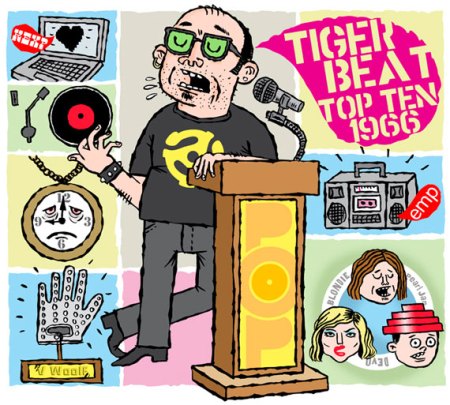
Auto-Tune, pop, and the body politic
May 5, 2009A bit of pop culture commentary today…
What I Learned at the Pop Conference. From The Stranger, a lighthearted summary of the goings-on at this year’s EMP Pop Conference, which had the theme, “Dance Music Sex Romance: Pop and the Body Politic.” Under the heading, “People Like Gimmicks,” author Eric Grandy describes this talk:
Douglas Wolk, presenting a paper on the incorporeality of club and radio DJs, the disconnect between their bodies and the sound they produce—they can’t physically touch the sound they create the way that a guitarist can touch the vibration of a string, they aren’t physically interacting with their audiences, and if they’re doing their job right they might as well not even have a physical body—stood at the podium, silently shuffling his papers every couple minutes and cueing video clips while prerecorded voices read the paper he’d written. A cute and effective conceptual stunt.
The article is a great overview of the conference that captures both academic music nerdery, silliness and—the best part—the intersection of the two.
Auto-Tune reconsidered. Like most indie music fanatics, I have considerable disdain for Auto-Tune—at its best, it’s a crutch, and at its worst, it’s a way for people (young skinny beautiful people, that is) with no musical talent to become pop stars. That is, until I read this article in Frieze Magazine, “Pitch Perfect”. In particular, Jace Clayton pulls in examples from Cher to Kanye West to North African Berber pop, complete with embedded YouTube videos so you can listen. He argues that effective use of Autotune requires the vocalist to work with the electronics:
Unlike traditional effects such as reverb or echo, Auto-Tune actively responds to human error and pitch subtleties. It doesn’t flatten or smooth. Nor does it universalize. Ari Raskin, chief engineer of high-end Manhattan recording studio Chung King, explains, ‘if you sing really ‘on’ [key] then the effect is less drastic’. The software works hard to make wrong notes right, so correctly-pitched notes sound relatively natural. But a virtuoso will confound the software when sliding around notes. The interplay becomes complex.
and that this melding of the human and the digital is a ‘cyborg embrace.’ Check out the whole article and see if it makes you re-think the use of Auto-Tune, too.
[image credit: Mark Kaufman, The Stranger]
MP3: Matmos – Regicide [buy]





Here’s what made me reconsider Auto-Tune.
nope, still despise the use of auto-tune. when one of the prime examples offered is lil wayne, there wasn’t much of a chance that I’d be convinced, anyway. as much as I can’t stand any of the dreck on the pop charts, it would be better if they were at least populated with people who could actually sing.
[…] are taking flak for the track “Heartbeat,” off their brand-new album, Vapours, for the heavily-Auto-Tuned vocals. In this interview over at Street Carnage, Nicholas Thorburn defends their decision to use […]